|
|
|
Sort Order |
|
|
|
Items / Page
|
|
|
|
|
|
|
| Srl | Item |
| 1 |
ID:
152917
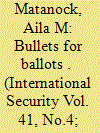

|
|
|
|
|
| Summary/Abstract |
Why does fighting recur following some civil conflict peace settlements, but not others? What kind of agreements are associated with more enduring peace? Post-conflict elections can often complicate and even undermine peace agreements. Agreements that contain “electoral participation provisions,” however, may help stabilize settlements and produce more enduring peace. Electoral participation provisions mandate that rebel groups be allowed to compete alongside the government in post-conflict elections. Such provisions encourage external actors, such as intergovernmental organizations and foreign donors, to become engaged in post-conflict elections. As part of this engagement, they can provide incentives to the parties to adhere to the terms of the settlement, as well as detect and sanction instances of noncompliance. New cross-national data suggest that conflict after peace settlements recurs less often when electoral participation provisions are included than when they are not. The data also suggest that this pacifying relationship holds when combatants expect international engagement.
|
|
|
|
|
|
|
|
|
|
|
|
|
|
|
|
| 2 |
ID:
152919
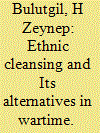

|
|
|
|
|
| Summary/Abstract |
According to the extant literature, state leaders pursue mass ethnic violence against minority groups in wartime if they believe that those groups are collaborating with an enemy. Treating the wartime leadership of a combatant state as a coherent unit, however, is misleading. Even in war, leaders differ in the degree to which they prioritize goals such as maintaining or expanding the territory of the state, and on whether they believe that minority collaboration with the enemy influences their ability to achieve those goals. Also, how leaders react to wartime threats from minority groups depends largely on the role that political organizations based on non-ethnic cleavages play in society. Depending on those cleavages, wartime minority collaboration may result in limited deportations and killings, ethnic cleansing, or minimal violence. A comparison of the policies of three multinational empires toward ethnic minority collaborators during World War I—the Austro-Hungarian Empire and Italians, the Ottoman Empire and Armenians, and the Russian Empire and Muslims in the South Caucasus—illustrates this finding.
|
|
|
|
|
|
|
|
|
|
|
|
|
|
|
|
| 3 |
ID:
152918
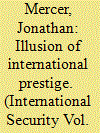

|
|
|
|
|
| Summary/Abstract |
Policymakers and international relations scholars concur that prestige is critical to world politics because states having prestige enjoy greater authority. An examination of how policymakers assess their and other states' prestige, however, reveals that this traditional view of prestige is wrong, for two reasons. First, policymakers do not analyze their own states' prestige, because they feel they already know it. They use their feelings of pride and shame as evidence of their state's prestige. Second, political and psychological incentives encourage policymakers to explain another state's behavior in ways that make it unlikely that states gain prestige. Policymakers systematically discount the prestige of other states; a belief that their state has earned the respect and admiration of others is therefore illusory. Consequently, the justification for costly prestige policies collapses. In other words, states should not chase what they cannot catch. Evidence from the South African War supports this conclusion.
|
|
|
|
|
|
|
|
|
|
|
|
|
|
|
|
| 4 |
ID:
152915
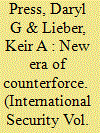

|
|
|
|
|
| Summary/Abstract |
Nuclear deterrence rests on the survivability of nuclear arsenals. For much of the nuclear age, “counterforce” disarming attacks—those aimed at eliminating an opponent's nuclear forces—were nearly impossible because of the ability of potential victims to hide and protect their weapons. Technological developments, however, are eroding this foundation of nuclear deterrence. Advances rooted in the computer revolution have made nuclear forces around the world considerably more vulnerable. Specifically, two key approaches that countries have relied on to ensure arsenal survivability since the dawn of the nuclear age—hardening and concealment—have been undercut by leaps in weapons accuracy and a revolution in remote sensing. Various methods, evidence, and models demonstrate the emergence of new possibilities for counterforce disarming strikes. In short, the task of securing nuclear arsenals against attack is far more difficult than it was in the past. The new era of counterforce challenges the basis for confidence in contemporary deterrence stability, raises critical issues for national and international security policy, and sheds light on one of the enduring theoretical puzzles of the nuclear era: why international security competition has endured in the shadow of the nuclear revolution.
|
|
|
|
|
|
|
|
|
|
|
|
|
|
|
|
| 5 |
ID:
152916
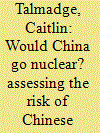

|
|
|
|
|
| Summary/Abstract |
Could a conventional war with the United States inadvertently prompt Chinese nuclear escalation? The military-technical threat that such a war would pose to China's retaliatory capability—combined with wartime perceptual dynamics that might cause China to view this threat in an especially pessimistic light—could lead to reasonable Chinese fears that the United States might be attempting conventional counterforce, or considering or preparing for nuclear counterforce. China might see several forms of limited nuclear escalation as its least-bad response to this sort of threat to its nuclear deterrent, notwithstanding the country's no-first-use policy. This finding, derived from a more general framework about the military-technical and perceptual drivers of potential nuclear escalation in response to conventional counterforce, has broader ramifications for U.S. policy and military strategy, and it illustrates recurring dilemmas that the United States may face in conventional wars with other nuclear-armed adversaries.
|
|
|
|
|
|
|
|
|
|
|
|
|
|
|
|
|
|
|
|
|